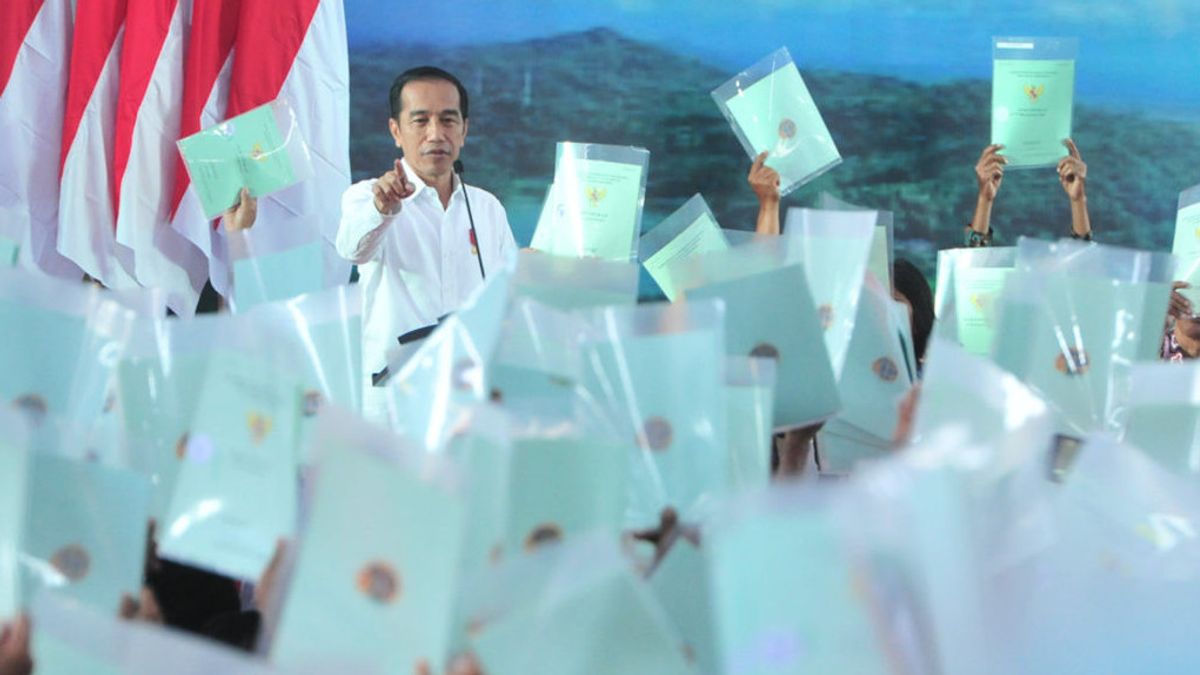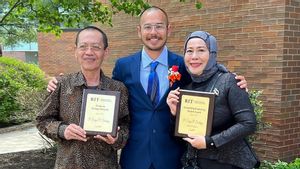JAKARTA - Land registration or certification is one of the current national policy focuses. However, the results of the Sejogyo Institute's research found that there was a policy shift related to land registration that was currently being promoted by the government.
The Sejogyo Institute, in this study, highlighted changes in the implementation of policies regarding land registration during 1960-2021. During that year there was a change in policy.
The obligation to register land, which should be the responsibility of the government, has recently shifted its burden. The obligation to register land is attached to the landowner. According to the activist of the Sajogyo Institute, Rahma Amin, there is a violation of the law (UU) here.
According to Article 19 of the Basic Agrarian Law (UUPA), it is explained that the obligation to certify land is the government's obligation. Not society. This study details the shifts and changes in implementation over time.
Tracking changes in land titling policies
The results of the Sejogyo Institute's research found that the Old Order period - which lasted from 1959-1965 - was the most important era for the milestone of land registration in Indonesia. During that period, UUPA Number 5 of 1965 and Government Regulation (PP) Number 10 of 1961 were issued, which explicitly stated that land registration was mandatory.
This era is also commonly called the initial milestone of the legal codification of land registration. Article 19 of the UUPA is the beginning of the mandate of the Law that land registration is one of the important priorities in land management.
Concretely, the UUPA explains land registration as an obligation that must be carried out by the state to ensure legal certainty of land ownership in Article 19. Meanwhile, the obligations for rights holders are expressly stated in Article 23 regarding property rights, Article 32 concerning cultivation rights, and Article 38 concerning rights. use building.
The next era was the New Order, which referred to the Suharto era. The New Order was the beginning of the degradation of land registration activities.
"This can be observed from the Department of Agrarian Affairs, which was lowered to the directorate general at the Ministry of Home Affairs. Meanwhile, land registration is under the Directorate of Land Registration," said Sajogyo Institute activist Rahma Amin.
Land registration activities in this period were held as an improvement from the slow progress of previous land registrations. This is also an effort to provide legal certainty and protection to rights holders and provide information to interested parties.
After Suharto stepped down, we entered the era of reform. This era began in 1998 after the resignation of President Soeharto on May 21, 1998, and was replaced by BJ Habibie, the Vice President at that time.
The reform era was marked by the change of several presidents, starting from BJ Habibie, Abdurrahman Wahid, Megawati Soekarnoputri, Susilo Bambang Yudhoyono and Joko Widodo. Of the five presidents, there were no fundamental and significant changes related to land registration policies.
In the Habibie era, not many policies were raised regarding land registration. At this time, land registration is carried out in the form of a comprehensive and systematic Inventory and Registration of Control, Ownership, Use and Utilization of Land (IP4T) in the context of implementing land reform.
One of the important legacies of the Habibie period was the issuance of Decree of the People's Consultative Assembly (TAP MPR) Number IX/MPR/2001 concerning Agrarian Reform and Natural Resource Management. This TAP MPR is the driving force behind the emergence of IP4T as an instrument of land data collection.
IP4T is systematically carried out in one village as information for planning land activities and formulating technical policies. In the era of Susilo Bambang Yudhoyono, land registration was carried out to support improving the performance of land services in order to increase public trust through the acceleration and simplification of land services.

The scope of land registration is as part of the support for guaranteeing legal certainty in the land sector, which is crucial to support the improvement of sustainable national development. LARASITA (People's Service for Land Certification) is one of the pieces of land policy in the era of Susilo Bambang Yudhoyono.
In the era of Joko Widodo, land registration was carried out to realize the provision of legal certainty and legal protection of community land rights based on simple, fast, smooth, safe, fair, equitable, and open and accountable principles. This is expected to improve the welfare and prosperity of the community and the country's economy.
In addition, the Jokowi era land policy was also carried out with the aim of reducing and preventing land disputes and conflicts. The scope of land registration is land registration in a complete systematic registration scheme.
The scheme in question includes planning, location determination, preparation, formation, and determination of the PTSL (Complete Systematic Land Registration) adjudication committee as well as task forces, counseling, physical data collection as well as juridical data collection.
The juridical data research is carried out for proof of rights, the announcement of physical data, juridical data, ratification, confirmation of conversion, recognition of rights and granting of rights, bookkeeping of rights, issuance of land rights certificates, documentation, and submission of activity results and reporting. In the Jokowi era, the acceleration of land registration became a priority agenda in the PTSL scheme which replaced PRONA (The National Agrarian Operations Project).
Shifting commitment from the government

From the explanation above, the results of this study indicate that land registration is a separate process from agrarian reform. This situation occurred in the course of implementing land registration policies in Indonesia, where the position of agrarian reform as a policy priority experienced a shift in commitment from the government.
Land registration as an instrument of land reform ended with the receding of the land reform program in the New Order era. Land registration which was originally part of the national agrarian politics underwent a process of degradation as administrative-technical governance.
This shows that land registration has lost its role in examining inequality in land tenure and ownership. Land registration has changed as the ultimate goal of land management.
It is in this context that the harmony of land arrangement which leads to the greatest prosperity of the people must be questioned again. Land registration in the Soekarno era was in line with the agrarian structure school.
Meanwhile, after Soekarno, land registration is closer to the property rights school. And because the property rights school is adopted, the target is the 'clean and clear' area and does not target inequality as was done during the Soekarno era.
The Ministry of Agrarian and Spatial Planning/National Land Agency (ATR/BPN) suspects that the urgency of the agrarian problem in Indonesia is that land has not been registered. This results in uncertainty over land rights which can lead to conflict.
The ideal agrarian reform policy should be designed to solve agrarian problems that cause inequality in land tenure and ownership in Indonesia. The perception of this agrarian problem is different from the government's perception where the agrarian problem lies in the legal uncertainty of land rights so that land registration (certification) is needed.
Land registration policy in Indonesia - which was originally born to encourage the implementation of land reform - in its development is more directed to become an instrument for solving agrarian problems, one of which is directed at resolving various agrarian conflicts due to legal uncertainty over land rights.
Agrarian conflict data is repeatedly raised in the policy background to reaffirm the number of agrarian conflicts indicating that land administration in Indonesia needs improvement in order to provide legal certainty of land rights.
In the end, land registration is more understood as part of land administration. The final product of land registration activities is a land certificate. The implementation of the land registration policy is more closely related to what is then called asset legalization or land certification.
To build a land administration system as an important part of the development by making land a modality for people's welfare, it must go beyond the limitations that have existed in the land administration system.
The current land administration is still stuck on asset legalization, the implementation of which is technical-bureaucratic and has not been able to unravel agrarian problems, let alone become an early detection tool for land issues.
The English, Chinese, Japanese, Arabic, and French versions are automatically generated by the AI. So there may still be inaccuracies in translating, please always see Indonesian as our main language. (system supported by DigitalSiber.id)













